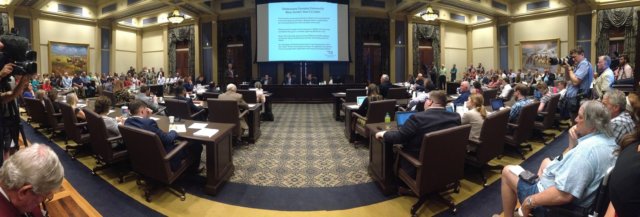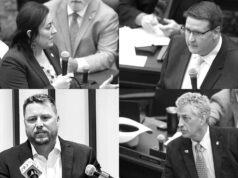
A complicated labyrinth of potential regulations surrounds Oklahoma’s implementation of State Question 788. For at least one member of the Legislature’s newly formed working group on medical marijuana, anyway, that emerged as the dominant take-away.
After more than two and a-half hours of presentations and questions Wednesday during the group’s first meeting, Sen. Greg McCortney (R-Ada) described the situation facing lawmakers as “a whole lot to learn and a short time to do it.”
“I leave here with a lot more questions than I came in with,” McCortney said after the meeting had adjourned at the Oklahoma State Capitol.
Finding answers to those questions will likely become more complicated as lawmakers seek to remain true to the will of voters who supported SQ 788 while considering constituents’ concerns during an election season.
House Majority Floor Leader Jon Echols (R-OKC) opened the meeting with a reassurance that such a needle would be threaded as best as possible.
“We are not here to re-litigate 788,” he said. “We are here to effectuate the will of the people.”
The rare bicameral, bipartisan working group (members listed at the end of this article) heard recommendations from four factions of pro-medical-marijuana stakeholders Wednesday. The legislative group’s stated purpose is to eventually create a permanent regulatory framework for medical cannabis in Oklahoma.
First up: Green the Vote
Presenters from the Tulsa-based advocacy group Green the Vote — whose tagline is “Bringing sensible cannabis reform to Oklahoma” — went first Wednesday, emphasizing that lawmakers should adhere to the original intent and language of SQ 788 when developing regulations.
Group president Isaac Caviness, cannabis activist Chris Moe and lawyer Ron Durbin II outlined six demands they would like to see implemented regarding SQ788’s current form:
- no restrictions on access between patient and provider (emergency provisions had introduced a clause that women be tested for pregnancy before being issued a medical marijuana license, for example);
- no exclusions on the types of cannabis available to patients (the Board of Health had banned smokable forms of marijuana July 10);
- no restrictions on the locations of medical marijuana-related businesses (e.g. current bans on locations within 1,000 feet of a school or church) besides what 788’s language originally stipulated;
- no excluding of potential employees from entering the new industry owing to prior felony convictions;
- no restrictions on medical marijuana-growing operations based out of private residences;
- no financial threshold for granting would-be businesses a license to operate in the new industry (the intent being to allow mom-and-pop types access to the new industry)
Although it was not mentioned, Green the Vote has a pending lawsuit against the Board of Health.
Up second: Oklahomans for Health
Chip Paul, co-founder of Oklahomans for Health, described his group as “the listening point” for SQ 788 and claimed authorship of the original ballot language. As such, his goals aligned with Green the Vote, in that he and his group favor preserving the initiative’s original intent before the Board of Health made certain changes in the middle of July.
Paul laid out three “principle tenets” of SQ 788 during his video-slide presentation, which was posted online before Wednesday’s meeting:
- to not limit a physician’s ability to “recommend” medical marijuana across a broad range of medical conditions;
- to make medical marijuana, as a business opportunity, available to most Oklahomans;
- and to allow any Oklahoman with a medical marijuana license to “grow their own medicine.”
“After you get over all the sexiness and the craziness and all that, it’s like turmeric. It’s like sage. So it’s in that category of things,” Paul said of cannabis in the course of explaining its naturopathic qualities to the lawmakers.
In June, just about a week prior to the vote, Paul was forcibly removed from a discussion about SQ 788 by the Rogers County sheriff. Paul has a pending lawsuit filed in that matter.
Penultimate presentation: Oklahomans for Cannabis
Unlike the previous two groups, Oklahomans for Cannabis (which has now formed the Oklahoma Cannabis League) focuses more on advocating for patients’ rights and access to medical marijuana rather than the minutia of policy creation.
“I’m here for the patients, not for businesses,” said Shawn Jenkins, who cited medical conditions in his own children that, while current medications fail to treat them effectively, medical cannabis would help.
Ray Jennings joined Jenkins in offering testimony as to the real-world medical benefits of doctor-prescribed marijuana.
“I’m a very conservative Republican. I’m a Christian, and I’m a cancer survivor,” he said. “I’m here for a reason.”
Final round: New Health Solutions Oklahoma
New Health Solutions Oklahoma bills itself as “the trade association for Oklahoma’s cannabis industry.” Speaking last and solo, executive director Bud Scott described SQ 788 as a “skeletal framework” that his group seeks to flesh out.
Rather than present an overview of his group’s 275-page legislative draft, Scott quickly opened himself up to questions from the working group. Eventually, Sen. Julie Daniels (R-Bartlesville) asked how Scott became so knowledgeable about this industry.
“My background personally, without incriminating myself too much, I’ve been around this industry since I was a child,” he replied.
Now an attorney, Scott also cited experience with commercial cannabis in The Netherlands (where recreational marijuana has been legal for decades) as well as legal work representing cannabis-industry clients in other states.
New Health Solutions Oklahoma has been vocal in calling for the Legislature to enter special session — something the other groups largely oppose — to address the issues surrounding 788’s implementation and avoid future ones. (Scott has also been a podcast guest on this site.)
Future marijuana meeting scheduled
Wednesday’s marijuana meeting represented the first of likely several such gatherings in which lawmakers will seek to educate themselves on the many ins and outs of establishing a medical cannabis industry in a state that only recently approved alcohol modernization. The next meeting is set for 9 a.m., Wednesday, Aug. 1, in Room 535 of the Oklahoma State Capitol, and subsequent meetings are also slated to be held on Wednesdays.
Background
Wednesday’s marijuana meeting also came one day before language in SQ 788 — which voters approved by almost 57 percent during the June 26 primary election — stipulates that the law takes effect. So far, however, controversy surrounding 788’s implementation has delayed the process. On July 18, Attorney General Mike Hunter requested the State Board of Health redo its rule-making after he sent a letter to the interim health commissioner stating the group “overstepped its authority.” The Board of Health is set to meet for reconsideration of the rules at 3 p.m. Wednesday, Aug. 1, at the Oklahoma State Department of Health.
Members of the working group on medical marijuana implementation
Senators
- Sen. Greg McCortney (R-Ada)
- Sen. Michael Brooks (D-OKC)
- Sen. Julie Daniels (R-Bartlesville)
- Sen. Darcy Jech (R-Kingfisher)
- Sen. Lonnie Paxton (R-Tuttle)
Representatives
- House Majority Floor Leader Jon Echols (R-OKC)
- Rep. Carol Bush (R-Tulsa)
- Rep. Scott Fetgatter (R-Okmulgee)
- House Minority Leader Steve Kouplen (D-Beggs)
- Rep. Ben Loring (D-Miami)
- Rep. Dustin Roberts (R-Durant)
- Rep. Jacob Rosecrants (D-Norman)
- Rep. Josh West (R-Grove)
(Correction: A previous version of this story overstated the number of lawsuits Green the Vote has pending against the Board of Health. NonDoc regrets the error.)





















